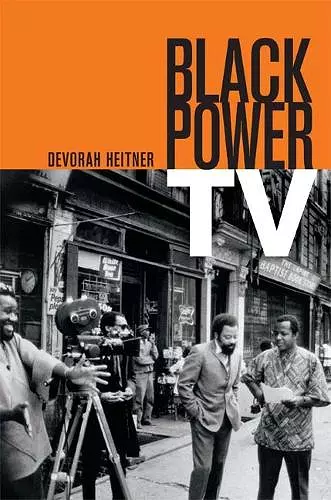Black Power TV
Format:Hardback
Publisher:Duke University Press
Published:12th Jun '13
Currently unavailable, and unfortunately no date known when it will be back

In the wake of the King assassination and subsequent uprisings, Black Public Affairs Television emerged. Devorah Heitner tells its story, analyzing the production, reception, and content of its early groundbreaking programs.In Black Power TV, Devorah Heitner chronicles the emergence of Black public affairs television starting in 1968. She examines two local shows, New York's Inside Bedford-Stuyvesant and Boston's Say Brother, and the national programs Soul! and Black Journal. These shows offered viewers radical and innovative programming: the introspections of a Black police officer in Harlem, African American high school students discussing visionary alternatives to the curriculum, and Miriam Makeba comparing race relations in the United States to apartheid in South Africa. While Inside Bedford-Stuyvesant and Say Brother originated from a desire to contain Black discontent during a period of urban uprisings and racial conflict, these shows were re-envisioned by their African American producers as venues for expressing Black critiques of mainstream discourse, disseminating Black culture, and modeling Black empowerment. At the national level, Soul! and Black Journal allowed for the imagining of a Black nation and a distinctly African American consciousness, and they played an influential role in the rise of the Black Arts Movement. Black Power TV reveals how regulatory, activist, and textual histories are interconnected and how Black public affairs television redefined African American representations in ways that continue to reverberate today.
"Black Power TV effectively works in the space of the articulation between an emergent radical Black identity, the ascendant network of public television, and the debate over what equality and racial democracy might actually look like from the vantage point of progressive Black people. Devorah Heitner provides a rich look into an exciting and innovative world of black self-making and self-representation."—Herman S. Gray, author of Cultural Moves: African Americans and the Politics of Representation
"When television shows produced by and for African Americans hit the airwaves, their unique and previously ignored perspectives were broadcast into American households for the first time. Programs created by Blacks, for Black audiences, revolutionized what people of color expected from public and commercial television. Devorah Heitner's dramatic account of African Americans' late-1960s breakthrough onto broadcast TV highlights the enduring significance of their achievement."—Jewelle Gomez, novelist, playwright, and former staffer for Say Brother
“Heitner provides a fascinating exploration of how national programs such as Black Journal and Soul!, along with local programs like Say Brother and Inside Bedford-Stuyvesant, ‘intervened in both the history of television and in the project of rearticulating racial formations that occurred in the Black Power era’...This book is a model of what great scholarship looks like. It is informative and engaging, and makes a considerable contribution to scholarship on the history of television.” -- S. Pepper * Choice *
“Black Power TV recovers an important chapter in the history of both U.S. television and the intertwined Black Arts and Black Power movements. . . . The detailed visual and rhetorical analysis of episodes [Heitner] retrieved from disparate archives and the oral history interviews she conducted with hosts, guests, and creators allow her to paint a vivid picture of Black public-affairs programs and to tell the story of their emergence and decline.” -- Lars Lierow * H-Soz-U-Kult, H-Net Reviews *
“Black Power TV provides a challenging experience to contemporary viewers, who are invited to imagine a different television image, which can also be recovered through the Internet, offering a glimpse into the activist past of Black television.” -- Delphine Letort * Black Camera *
“The history Heitner presents will be eye-opening for readers who are unfamiliar with the long struggle to diversify what we see on screen.” -- Eleanor J Bader * Truthout *
“By turns a social history and media analysis that draws on a range of sources, including the author’s impressive interviews with those directly involved in creating these shows, Black Power TV not only presents us with a story untold but also reminds us that there was a time when mainstream television had no choice but to talk meaningfully about racism and structural inequality – that is, to do so in ways that were often unsettling, not sanitized.” -- Eric Tang * Ethnic and Racial Studies *
"[T]his well-researched and highly readable book weaves a rich tale of both local and national black public television series as they attempted to create black public spheres. . . . Black Power TV provides an engaging and well-researched examination of a Golden Age of black public television that seems unlikely to emerge again." -- Alfred L. Martin * International Journal of Communication *
“Black Power TV is an innovative, nuanced, and tightly focused book…. [it] is a lively read and brings to light an important and understudied period in television history.” -- Matt Delmont * Journal of American History *
"A thoroughly researched, accessible, and well-written book. . . . Heitner reclaims a vital but heretofore marginalized aspect of the black power movement." -- La Donna L. Forsgren * American Literature *
ISBN: 9780822354093
Dimensions: unknown
Weight: 435g
208 pages